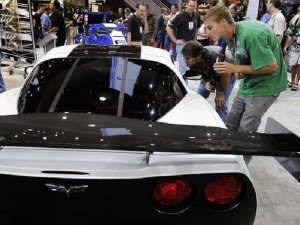
CAR TRADE SHOW. A Specialty Equipment Market Association (SEMA) trade show in Las Vegas, Nevada on Nov. 4, 2010 showed attendees visiting the General Motors booth to look inside a 2011 Chevrolet Corvette Z06X track concept car. This year, the Philippines is a participant in the four-day event starting November 1 also in Las Vegas, Nevada where a prototype all-electric sports grand touring car designed and engineered by a team of Filipinos will be unveiled. AFP
Not all sports cars are created equal. Now, with recent developments in alternative fuels, the inequality widens some more.
A prototype all-electric sports grand touring car has been designed and engineered here in the Philippines by a team of Filipinos and is hoped to create quite a stir when it unveils at the Specialty Equipment Market Association (SEMA) at the Las Vegas Convention Center in Nevada in November 1-4.
Named GT111, its electric power is estimated to give it a top speed of 250 kph and an acceleration of 0 to 100 kph in 5 seconds. Its 250 horses can go as high as 800 hp, depending on the owner’s preference. And being an electric car, it has lots and lots of torque, up to 320 lb/ft available from zero rpm. How’s that for an electrifying ride?
Jan Kierulf, president of Michel Motorsport, the local team responsible for the electric sports car, confirmed to Inquirer Motoring that the project has been a cross-continental effort involving various developments from different countries.
“The conceptual objective, design, pre-engineering through manufacturability project management, and business planning is Filipino. The chassis and suspension and vehicle standards collaboration is with a British partner. The electric power train development is United States,” he said.
Kierulf added that though the initial market penetration has been set for continental Europe, “we thought it best that we join SEMA to get a feel of the US market and also to hook up with potential industry partners at the same time. We joined SEMA for whatever exposure it can generate. It is an exercise in immersion, we dive right there and swim with the industry players and somehow see where the niche is for the car and for our company Michel Motorsport.”
He added that the car his team will be featuring at SEMA will be powered by a liquid-cooled electric AC motor.
“The car is manufactured to be light and promises to deliver the much-sought-after performance and driving range. The power is scalable, and can go as high as 800 hp, depending on what the customer orders. It can be configured to have two inboard direct drive rear mounted motors or can be configured to be powered in all four wheels. The objective of the car project is to establish three things: exceptional design, performance, and robustness/reliability. We want the car and the brand to be equated to this attributes early on at the onset,” Kierulf said.
Christopher Lacson, the designer at Michel Motorsport, said that the pre-production electric prototype car has an impressive estimated 5-second bracket if run from 0 to 100 kph.
Lacson added that the GT111 will be equipped with a range extender device to soothe the “range anxiety” (of sports car aficionados). The liquid cooled e-motor, he explained, is one of the most powerful of its kind, and waterproof.
Retro-modern design
Its design parameter is both recognizable and completely new. Lacson, who graduated from the prestigious Art Center College of Design in Pasadena, California, said that it includes making the outline of the car familiar and retro modern with retro flourishes and feel.
Lacson said that the GT111 has a “wide stance with an attitude, fierce but not mad, and purposeful.” He added that it has the styling cues of Maserati, Ferrari and other retro GT cars.
Lacson elaborates on the design and layout of the drivetrain, which is similar with the typical drivetrain layout of sports GT cars with the 5-speed gearbox. Its engine is situated in front.
Purposefully on the map
Kierulf, who despite the name clarified that he was Filipino, said, “At the onset we decided that the company, Michel Motorsport, should take on a project that would strive to put the Philippines on the world automotive scene but in a careful and logical way. The electric car has been primarily a program that by definition is high risk and we knew full well that it might not give us any immediate returns on investment. So each facet of a vehicle business program should be assessed and carefully planned.”
“The car is a positive contribution to the Philippine automotive industry, for whatever it is worth, whether to make our country known for design competency or for innovative and cost effective prototyping abilities, or for project management skills in vehicle development or simply to make us known for our passion for cars as a country or as a nationality. The car is commercially viable. The greatest compliment is if the car gets bought and cherished enough by its owners that they form car clubs of it,” he added.